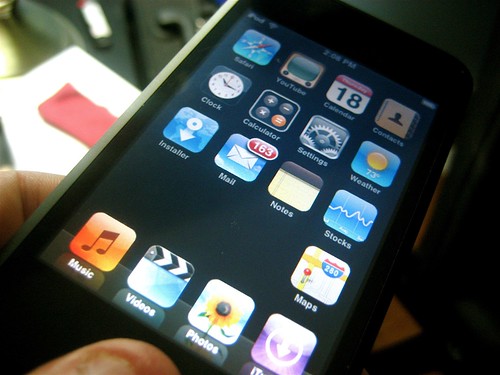Generation iPod
As of October of 2007, Apple has sold approximately 120 million iPods worldwide. At approximately $250 each, that’s $30 billion dollars in revenue. It is without a doubt one of Apple’s crowning technical achievements, both for the ingenuity of the hardware and for the revolutionary integration with software on several platforms.

And yet lately, as I’ve trekked the 30 minute walk between my home and work with my iPod blaring away, I’ve started to wonder what the impact of this technology really is. For starters, those of us who listen to iPods frequently are subjecting ourselves to potential hearing damage. Even at my age, I find myself frequently asking people to repeat themselves. I’ve also found that I have a great deal of difficulty hearing individuals in crowded places or bars with lots of chatter. And while my hearing has never been perfect (thanks to an uncle that went a little nuts with a firecracker when I was a kid), I am quite certain it has degraded quite a bit in the last few years.
And while I can’t say with 100% certainty that my iPod has caused any harm to my hearing, experts have started voicing their concerts about the long term consequences of the MP3 generation.:
Audiologists believe tens of thousands of young people are causing serious damage to themselves, and are likely to suffer tinnitus and loss of hearing in later life. The experts say MP3 players should be designed to prevent people playing music above 90db, about two-thirds of the maximum volume of a typical device,” the report warns.
Apple’s device easily exceeds that volume limit – in fact a French law (emulated by Apple across Europe) requires that the computer company cap the iPods volume, but even the capped maximum still exceeds expert recommendations, at 100db.
And while the physical manifestations of the MP3 phenomenon may be limited to hearing loss in a small subset of buyers, there is an ever-growing concern about the social implications of personal music players. A recent article in the Seattle weekly discusses some of these:
The great paradox of the iPod is that the cultural phenom (more than 120 million sold) is purely isolationist. Whereas social networking and cell phones make the private public, iPods—more ubiquitous than the Walkmen they replaced—turn music from a public aesthetic experience into a private, mobile affair. (Note the failure of Microsoft’s Zune, an attempt to make MP3 players a social affair by allowing users to share music wirelessly.)
…
This social isolation is another likely outcome of iPod use, according to Areni, a professor at the University of Sydney who studies environmental psychology, music, and cognition. “Have you ever tried saying ‘hello’ to somebody listening to an iPod? If I see the white or black wires sticking out of somebody’s ears, I don’t even bother, even if it’s a friend. Again, in crowded public spaces, this may be a desirable outcome.
I think that last line is extremely relevant. On my daily walk each day, I basically cross from one side of downtown Vancouver to the other, often passing corner after corner of homeless people, especially down near the business sectors on Burrard Street. While most people generally ignore the homeless individuals begging for change, you’ll often notice many of these same people walk by with headphones firmly planted in their ears, completely impervious to any verbal requests, and perhaps even to whatever guilt they might have once felt. I realize that some of them undoubtedly just want to listen to music, but I suspect there are those who use MP3s and iPods and a means to limit social interaction, or at least have become comfortable with that secondary outcome. Despite the prevalence of social networks, cell phones, emails, and all this endless technology that was meant to bring people together, I somehow have this feeling lately like we are actually moving backwards, despite the constant forward motion I see outside my window daily.
I was talking to my grandmother at Christmas and she remarked how things have changed since she was a little girl. Back then, she said, people used to get together often, have dinners, stay up late on Christmas, attend each other’s birthday parties, laugh often, and even stop by unexpectedly a few times a week for tea. Now she says most people are just too tired or busy to come out most of the time, something that after 85 years of a happy, social life tends to saddens her. I think even in my own life there was a time when I used to pick up the phone to call friends every couple of days, and now with instant messaging and email, I find that I rarely have the impulse to. It’s guess it’s just far easier to send an email.
I have always been worried about the dangers of technology. While it is true that it is the use of the technology and generally not the technology itself that makes it harmful, I think we have the capacity to become too wrapped up in it all and lose ourselves. And while a MP3 player at the end of the day is simply a technological device to play music, I think there are dangerous social trends developing with their usage that are counterproductive to real-world communities and social, human interaction.
If we’re not careful, our generation may ultimately be remembered as the one that strolled through life with our heads down and our earbuds in, a generation of people oblivious to all sounds except for that faint static we made ourselves.
Updated: Matt posted this great article in his previous Facebook entry that talks about some of these social issues in the context of Facebook. Definitely a good read.